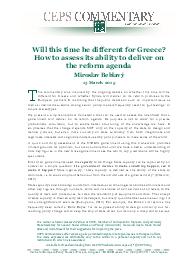Bulow, J. & Rogoff, K., (2015), “The modern Greek tragedy”, Voxeu, 10 Ιουνίου. The conventional wisdom in Greece is that the nation has suffered years of excessive, Troika-imposed austerity in a short-sighted effort to extract maximum repayment. This column argues that, in fact, Greece was a net receiver of Troika funds from 2010 to mid-2014, with a modest reverse flow since Greece stalled on its reforms. Both sides have negotiated …Read More
Pragmatism, the Greek crisis, and structural reforms: What theory says
Müller Andr., Storesletten K., Zilibotti F., (2015), “Pragmatism, the Greek crisis, and structural reforms: What theory says”, Voxeu, 27 May. In the policy circles, there are confronting positions regarding Greece’s assistance programme and the structural reforms it should implement. This column argues that the best response is pragmatism and sequential compromise. Efficiency requires an assistance programme providing the country with debt relief with an intervention of an institution such as …Read More
In It Together: Why Less Inequality Benefits All
In It Together: Why Less Inequality Benefits All, OECD, 21 May The gap between rich and poor keeps widening. Growth, if any, has disproportionally benefited higher income groups while lower income households have been left behind. This long-run increase in income inequality not only raises social and political concerns, but also economic ones. It tends to drag down GDP growth, due to the rising distance of the lower 40% from the rest …Read More
Are creditors pushing Greece deliberately into default?
De Grauwe, Paul, (2015) “Are creditors pushing Greece deliberately into default?”, 28 April. The Greek drama has entered its endgame. The Greek government has to repay loans to the IMF and other public institutions in the near future but does not have the cash to do so. The lenders refuse to come forward in providing liquidity as long as the Greek government does not accept the conditions they impose. We …Read More
Ireland’s Lessons for Greece
Heise, Michael, (2015), “Ireland’s Lessons for Greece”, www.project-syndicate.org, 23 April. Greece’s government, led by the left-wing Syriza party, is demanding a new deal from its European creditors, claiming that the bailout program provided by the “troika” (the International Monetary Fund, the European Central Bank, and the European Commission) has plunged their country into a spiral of deflation and austerity. But, while no one disputes that things have gone wrong in …Read More
Hall of Mirrors: The Great Depression, The Great Recession, and the Uses-and Misuses-of History
Eichengreen, Barry, (2015), Hall of Mirrors: The Great Depression, The Great Recession, and the Uses-and Misuses-of History, Oxford University Press USA The two great financial crises of the past century are the Great Depression of the 1930s and the Great Recession, which began in 2008. Both occurred against the backdrop of sharp credit booms, dubious banking practices, and a fragile and unstable global financial system. When markets went into cardiac …Read More
Should Greece Pay Back Its Debt?
Ozlem Onaran (2015) “Should Greece Pay Back Its Debt?“, Social Europe Journal, 23 April 2015. Financial speculators are nervously asking whether Greece will pay its debt or default. Political leaders from Europe to the US and the IMF are telling the Greek government to leave aside its democratic mandate and accept further austerity as a condition for getting credit to continue to pay back its debt. But the right …Read More
Modern Greece: What Everyone Needs to Know
Kalyvas, Stathis (2015), Modern Greece: What Everyone Needs to Know, Oxford University Press. Combines the most up-to-date economic and political-science findings on the current Greek crisis with a discussion of Greece’s history Greece’s economic and political future as a member of the European Monetary Union is very unpredictable at the moment, though the decision will have great repercussions for the rest of Europe and the world Makes original historical connections between …Read More
Will this time be different for Greece? How to assess its ability to deliver on the reform agenda
Beblavý, Μ. (2015) “Will this time be different for Greece? How to assess its ability to deliver on the reform agenda“, Centre for European Policy Studies (CEPS) Commentary, 13 March. Τhis commentary was inspired by the ongoing debate on whether this time will be different for Greece and whether Syriza will deliver on its reform promises to the European partners. It is striking thatthe public debate on such an …Read More
OECD tax burdens on wages rising without tax rate increases
OECD tax burdens on wages rising without tax rate increases, OECD Publications, April 2015. Taxes on wages have risen by about 1 percentage point for the average worker in OECD countries between 2010 and 2014 even though the majority of governments did not increase statutory income tax rates, according to a new OECD report. Taxing Wages 2015 says the tax burden has increased in 23 OECD countries and fallen …Read More







